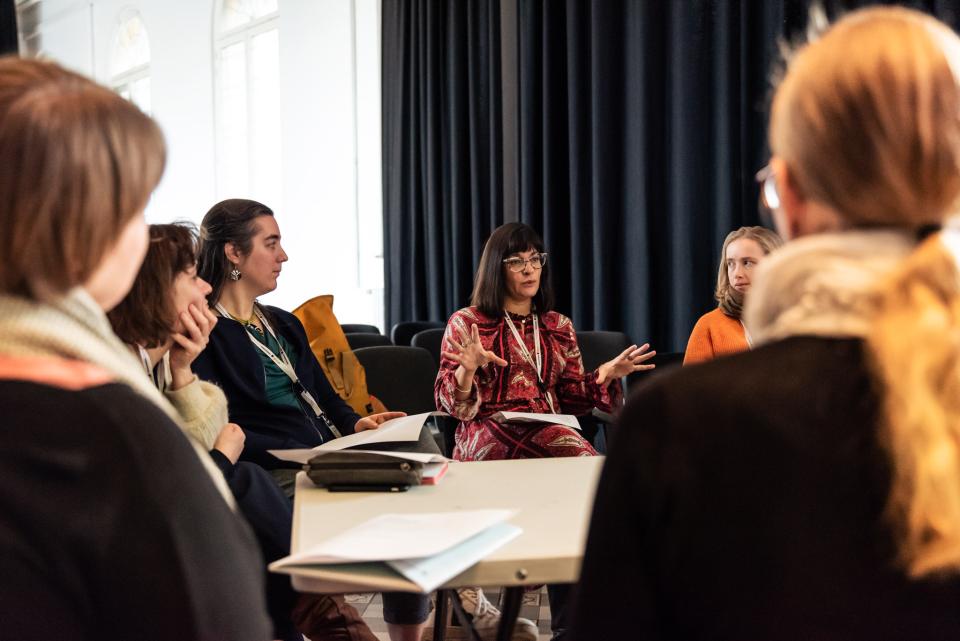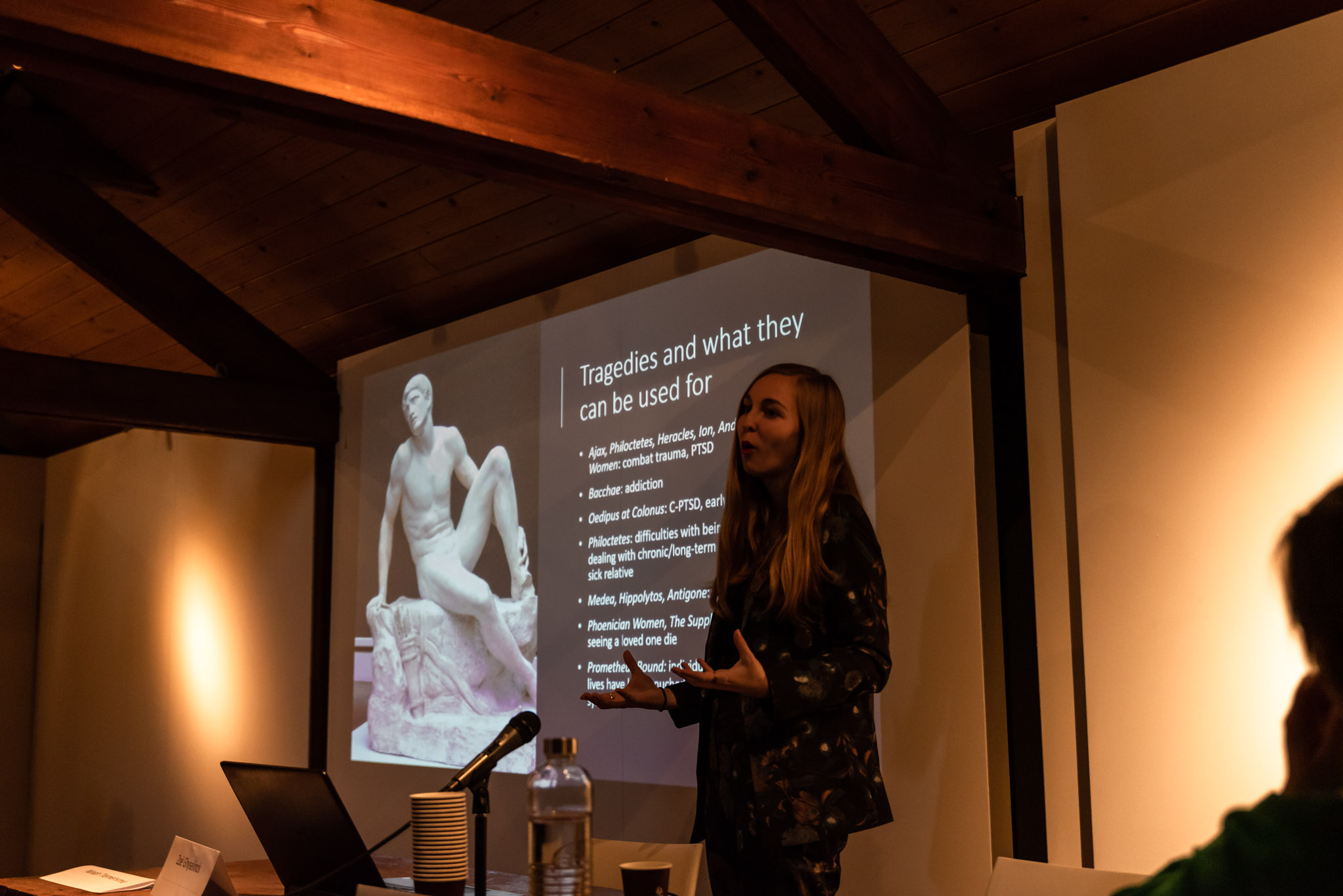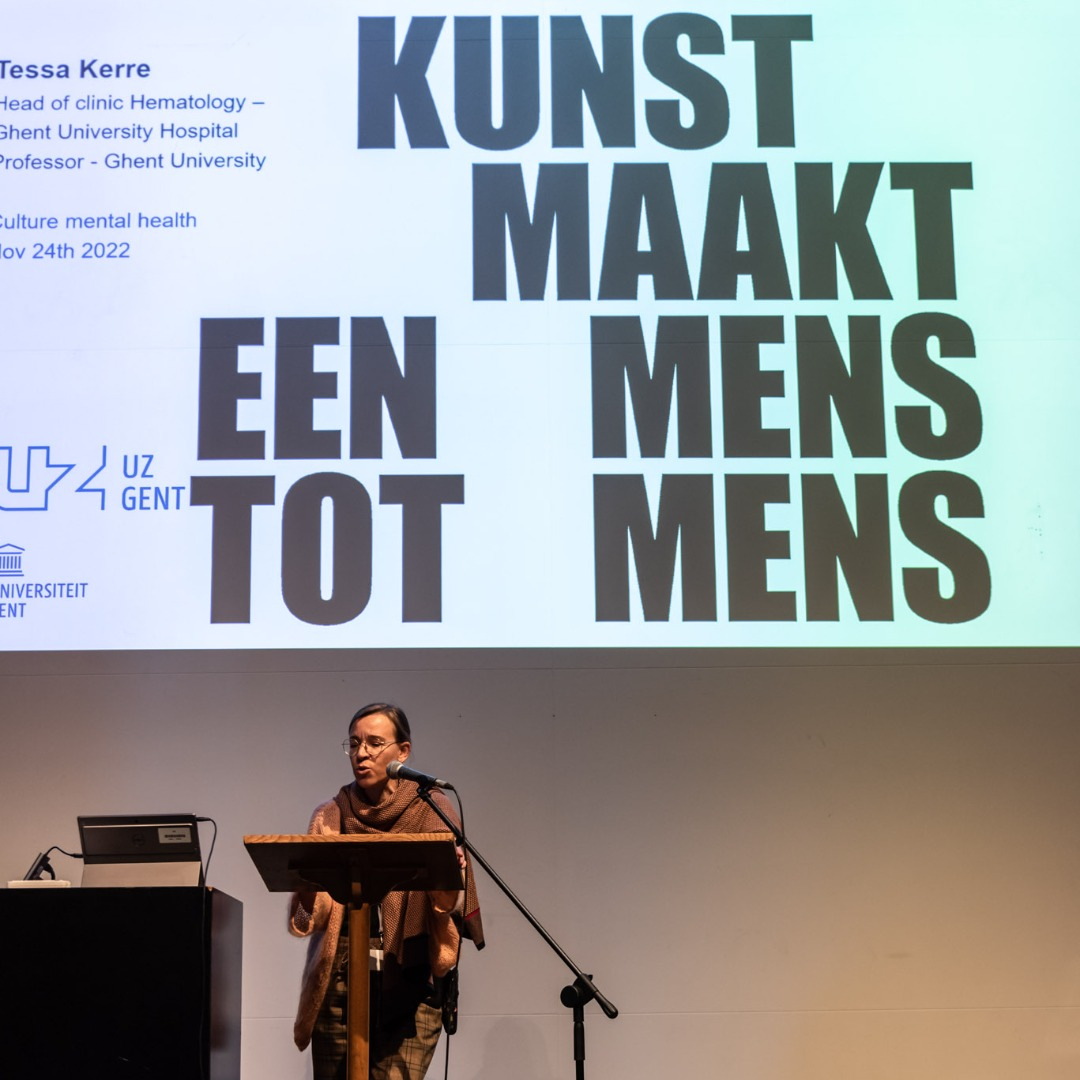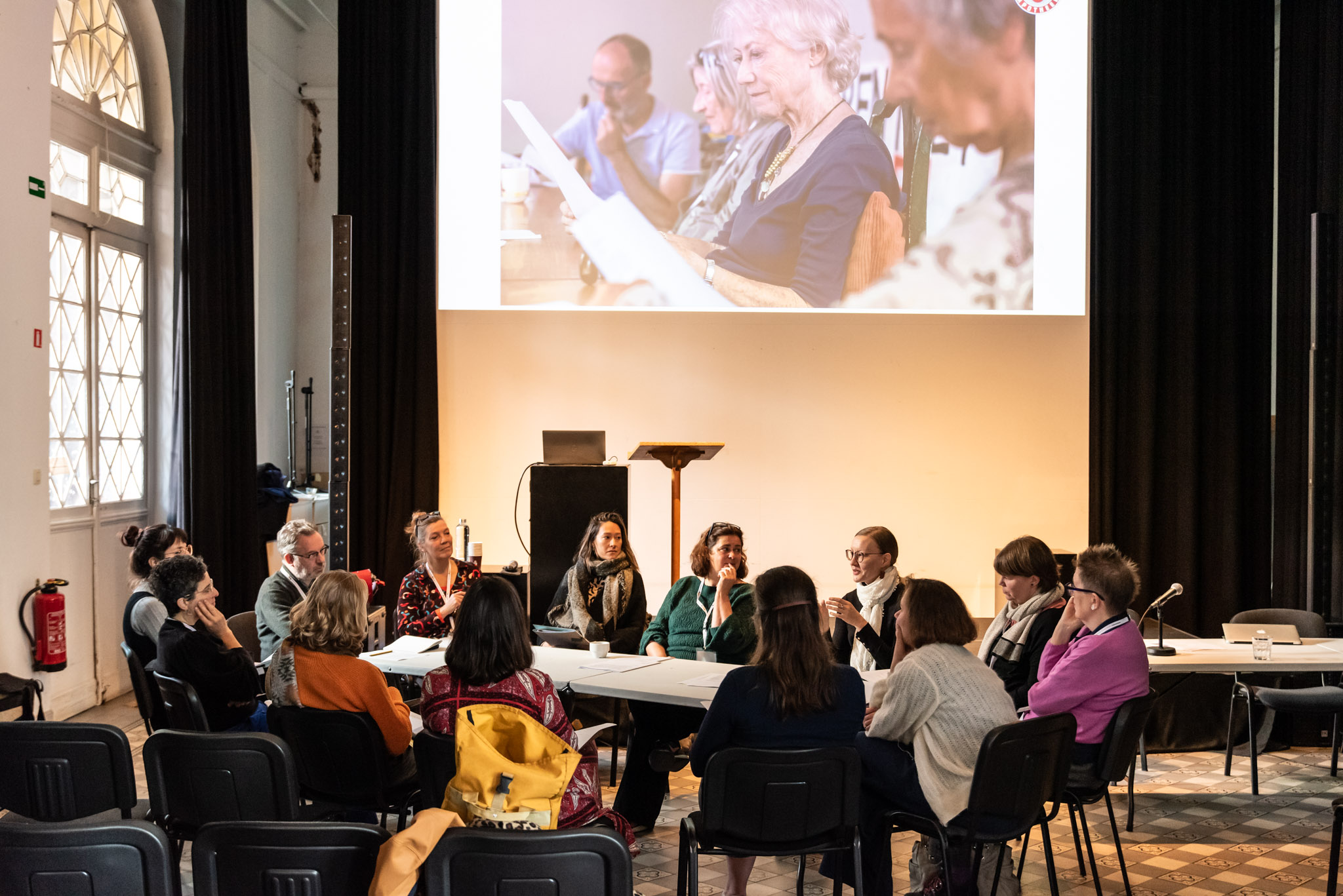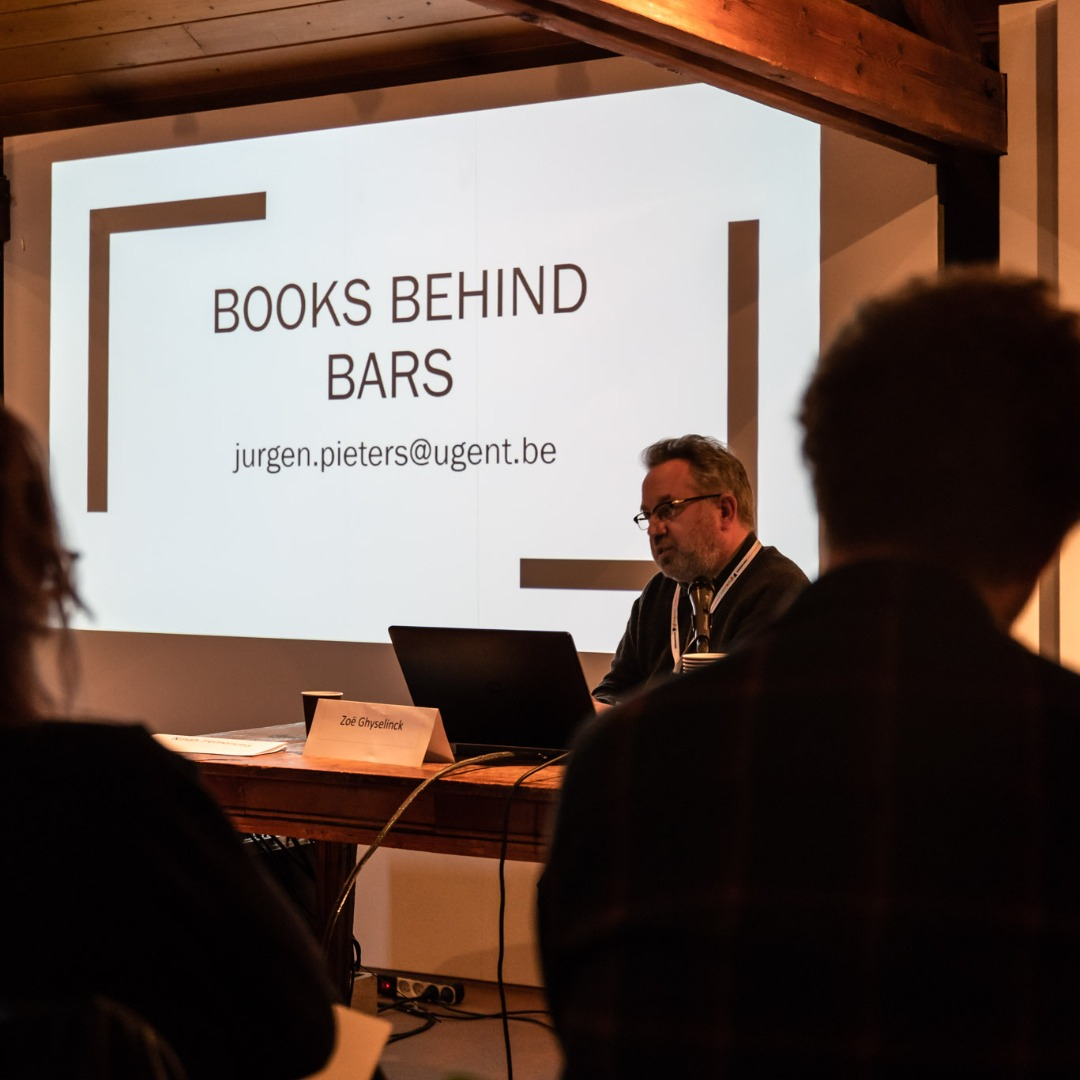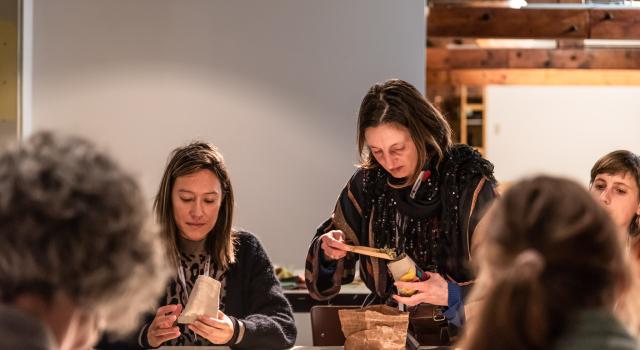The healing power of reading (together)
You can find solace in stories. They can hold up a mirror to you and can connect people, when they are read aloud or together with others. There is also a growing consensus in scientific literature that reading has a beneficial effect on our mental, physical and social well-being. Practical knowledge and experience are also increasing hand over fist, for example through collaborative reading projects.
translated into English by Sandy Logan
-> naar de Nederlandstalige versie van dit artikel
This article is a partial report on the international 'Culture & Mental Health' conference, organised by Museum Dr. Guislain and Iedereen Leest from 23 until 25 November 2022. The programme also focused on how reading, reading aloud and reading together can be used as an impactful cultural intervention in care. Several speakers shared insights from their research as well as experiences from their daily practice.
Have you ever read a book that seemed to have been written with you in mind? With situations that are eminently recognisable, or which asked just the right questions at the right time? Perhaps this has happened only once, or maybe several times. Chances are, however, that you've come across such a precious book before. For Ninah Tiemersma, who teaches Greek and Latin, Greek tragedies were a real eye-opener, making her feel less lonely. At the age of ten, she was diagnosed with PTSD (post-traumatic stress disorder) after being abused by her father. Therapy helped, but then she suffered a setback. When she travelled to Athens as part of her recovery, she began to read Greek tragedies. “While I couldn't quite identify with these characters from 2,500 years ago”, she says, “I did recognise the strong emotions. The protagonists of many of these tragedies are traumatised, tormented individuals, and these are universal themes.”
Because the Greek tragedies helped Tiemersma heal her childhood trauma, she decided to use them in conversational therapy sessions with fellow sufferers. She selects a tragedy together with the patient and they reflect on specific passages during various sessions. “I read the story to the patient, only stopping to respond to reactions, for example when the patient starts to laugh or sighs in relief.” Gradually she notices that recognisable situations in the tragedies inspire patients to think about how the characters and they themselves can organise their lives differently. “Greek tragedies are a great way of arriving at self-insights”, says Tiemersma. “They can help us better understand the quest that is life.”
Recovery and coping with loss
Stories can play an important part in psychological therapy, as well as in palliative care and coping with grief and loss, according to Dr Zoë Ghyselinck (Ghent University). She conducts research into necrodialogues in Western literature, theatre and media and is currently preparing a project on end-of-life narratives. These are the stories that people tell at the end of their lives, whether or not to a grieving reader-recipient. She will investigate the posthumous impact of such end-of-life stories on bereaved families, based on the premise that these stories can convey the identity, values and experiences of the dying person, in addition to providing solace for the bereaved in their (anticipating) grieving process.
Literature, and more generally art, can also help build courage during the recovery process. Professor Tessa Kerre, head of the haematology clinic at UZ Gent (Ghent University Hospital), is therefore planning to provide art as another form of room service in the hospital. “I used to see these bookcases on wheels make their way through the hospital corridors, but a few years ago the project was shelved because books were deemed too dangerous and were thought to spread bacteria, although there is no evidence of this.” Dr. Kerre is currently using all her persuasive skills to bring back the bookcases. In the meantime, she has also devised other ways of getting art to patients. “Doctors often rely on checklists to cure their patients, which improved the quality of care. But we should not forget the most important check: to talk and listen to patients”, she says. “With art, on the other hand, a person is a human being.” To convince her colleagues of the merits of her premise, Kerre showed them graphs: “Research has shown, for example, that children experience less pain during surgery after a game or after someone has read them a story. Reading aloud even has a greater impact than playing a game.”
That is why Tessa, and the Lezerscollectief, launched a project whereby students from the Faculty of Medicine and Health Sciences of Ghent University visit patients to read to them. This ‘warm care’ helps to establish a connection between care providers and their patients, it briefly transports them to a different world and makes them think back to certain times in their lives. “While listening to a story, a patient remembered how she had met her husband, something she hadn't thought about in a long time”, Kerre says. The hospital also has a reading box in the hospital, from which patients can draw a note with a poem or a short story. Cancer patients can also read a story together in a reading group and discuss it. That way, they can be people in hospital, instead of just being reduced to their status of patients.
Reading together with people with dementia
Akke Visser and Marije Wilmink of the non-profit organisation Culturele Apotheek have also observed that reading together as a group can be a tremendously connective experience. Together with the Culturele Apotheek, they have set up 35 reading groups across the Netherlands, based on the Shared Reading method. Under this methodology, which was developed by Jane Davis, a literary fragment is repeatedly read aloud in a group, after which the participants discuss it. “The reading groups are a safe place where participants can choose whether they want to talk or are happy to say nothing”, Wilmink stresses. “This exchange is very interesting, because people tend to interpret the text differently based on their own experience.”
The shared reading sessions of the Culturele Apotheek are open to people with dementia, among others. “The response has been positive”, says Akke Visser. “Based on feedback, we have observed that these sessions are more conducive to in-depth conversations than other activities. Reading together gives people an opportunity to talk about feelings, stimulates the imagination and evokes memories.” Professor Aagje Swinnen of Maastricht University also observed this effect. She focuses on reading together with people with Alzheimer's as part of The Alzheimer's Poetry Project. This method was devised by the slam poet Gary Glazner, with whom she worked in New York. “During a session we recite and improvise poems”, says Swinnen. “As the coach, I read a poem aloud, after which the participants repeat it line by line. In another assignment, we start by associating words and sentences with a certain theme, after which I improvise a poem with it as the coach and the participants recite it.” “The most important thing is that everyone is equal in these reading groups, no matter how good or bad your memory is”, Visser emphasises. In this collective experience, a person with Alzheimer is just another participant, just like the coaches, which eliminates the distance between them.
Reading friends
Reading can also promote social contacts between people who don’t know each other. During Covid, the British organisation The Reading Agency realised that libraries and in particular their reading groups were a way of reducing loneliness. That's why it devised the Reading Friends campaign, where anyone could sign up to become a ‘reading friend’ and meet other readers. As the campaign started during the lockdown, these meetings (one-on-one or in a group) initially took place online, but later they moved to the library, taking social distancing rules into account. These meetings turned out to be very connecting experiences because they offered participants an opportunity to talk about the stories they had read, as well as talk about other experiences. It even led to friendships in some cases. In 2021 and 2022, 3,728 people gathered across the UK in 72 libraries. More than 90 percent of the participants were satisfied with the experience. Since then, more than half have also felt more content and confident in life, with the meetings giving them something to look forward to during the week and feel more connected with other people.
Professor Jürgen Pieters also observed this effect in the prisoners with whom he had set up a reading group at De Nieuwe Wandeling prison in Ghent. Over a period of six weeks, five people from outside the prison, five people from inside the prison, and a reading supervisor met to discuss a story. The supervisor read the story to the participants and now and then she encouraged the participants to speak about what they saw, felt, thought about the text. “The texts we read with our group encouraged everyone to share their story. Everyone listened with attention and respect”, says Pieters. “Not to agree with all aspects of everyone's interpretation and story, but to find a connection despite the differences.” One of the inmates even said that these few meetings had already done more for his reintegration than any other activity in prison.
“The texts we read with our group encouraged everyone to share their story.”
Moreover, the effect is felt long after the story has ended. In his book Reading and Mental Health, Charles Darby-Villis, who has set up reading groups in a women's prison, wrote in about the fact that participants felt compelled to reflect more on their past and future, including after these reading group meetings. “There were strong indications that the reading group offered an opportunity for reflection that did not end with the group experience. (...) The space that is created in the reading group can also be called up in your mind, giving you a space for reflection, anytime, anywhere.”
The reading initiatives that were presented at the ‘Culture & Mental Health’ conference show that reading aloud, reading together, or simply reading by yourself has a healing effect on mental, physical and social well-being. It is an impactful cultural intervention that can be deployed both in preventive and residential health care contexts.
